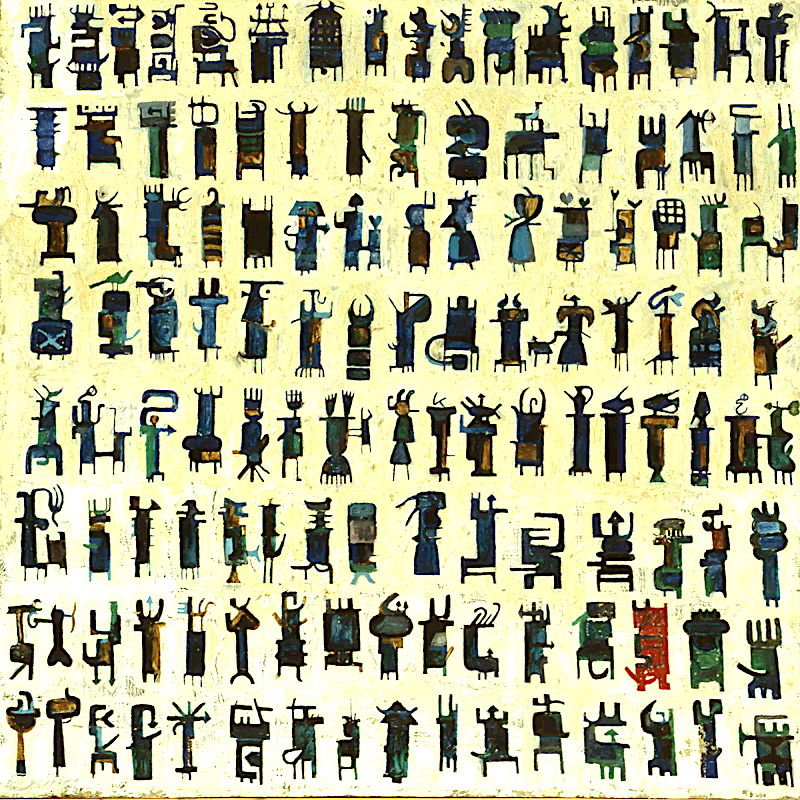From Israel’s bombing of Iran’s embassy in Damascus to Ecuador’s raid on the Mexican embassy in Quito, leaders feel emboldened by the impunity granted by the Global North.

Afshin Pirhashemi, Iran, Untitled, 2017.
By Vijay Prashad
Tricontinental: Institute for Social Research
 We live in dishonest times, where certainties have crumbled, and malevolence stalks the landscape.
We live in dishonest times, where certainties have crumbled, and malevolence stalks the landscape.
There is Gaza, of course. Gaza above all else is on our minds. Over 33,000 Palestinians have been killed by Israel since Oct. 7, with more than 7,000 people missing (5,000 of them children).
The Israeli government has brutally disregarded global public opinion mounted against them. Billions of people are outraged by the stark fact of their violence and yet we are unable to force a ceasefire from an army that has decided to raze an entire people.
Global North governments speak from two sides of their mouths: clichéd phrases of concern to ameliorate their own disheartened populations, and then vetoes at the United Nations and arms transfers to the Israeli army.
It is this two-faced behaviour that bolsters the confidence of people like Israeli Prime Minister Benjamin Netanyahu and enables their impunity.
That same impunity allowed Israel to violate the U.N. Charter (1945) and Vienna Convention on Diplomatic Relations (1961) on April 1 when it bombed the Iranian embassy in Damascus, Syria, killing 16 people – including senior Iranian military officers.
This impunity is infectious, spreading amongst leaders who feel emboldened by Washington’s arrogance. Among them is Ecuador’s President Daniel Noboa, who sent his paramilitary forces into the Mexican embassy in Quito on April 5 to seize the country’s former Vice President Jorge Glas, who had been granted political asylum by the Mexican authorities.
Noboa’s government, like Netanyahu’s, set aside the long history of international respect for diplomatic relations with scant regard for the dangerous implications of this kind of action.
There is a feeling amongst leaders such as Netanyahu and Noboa that they can get away with anything because they are protected by the Global North, which anyway, gets away with everything.
Centuries of Diplomacy Upended

Lucía Chiriboga, Ecuador, untitled, from the series “Del Fondo de la Memoria, Vengo” or “I Come from the Depths of Memory,” 1993.
Diplomatic customs go back thousands of years and across cultures and continents. Ancient texts written by Zhuang Zhou in China and his contemporary in India, Kautilya, in the fourth century BCE set the terms for honourable relationships between states through their emissaries. These terms appear in almost every region of the world, with evidence of conflicts resulting in agreements that include the exchange of envoys to maintain peace.
These ideas from the ancient world, including Roman law, influenced the early European writers of customary international law: Hugo Grotius (1583–1645), Cornelis van Bijnkershoek (1673–1743) and Emer de Vattel (1714–1767). It was this global understanding of the necessity of diplomatic courtesy that formed the idea of diplomatic immunity.
In 1952, the government of Yugoslavia proposed that the International Law Commission (ILC), set up by the U.N., codify diplomatic relations.
To assist the ILC, the U.N. appointed Emil Sandström, a Swedish lawyer who had chaired the U.N. Special Committee on Palestine (1947), as special rapporteur.
The ILC, with Sandström’s assistance, drafted articles on diplomatic relations, which were studied and amended by the 81 member states of the U.N. at the time. At a month-long meeting in Vienna in 1961, all the member states participated in the Convention on Diplomatic Relations.
Amongst the 61 states that became signatories were Ecuador and Israel, as well as the United States. All three countries are, therefore, among the founding states of the 1961 Vienna Convention.
Article 22.1 of the Vienna Convention says:
“The premises of the mission shall be inviolable. The agents of the receiving State may not enter them, except with the consent of the head of the mission.”

Safwan Dahoul, Syria, Dream 77, 2014.
At a briefing in the U.N. Security Council about Israel’s recent strike on the Iranian embassy in Syria, Deputy Ambassador Geng Shuang of China reminded his colleagues that 25 years ago, the U.S.-led NATO bombing of Yugoslavia resulted in an attack on the Chinese embassy in Belgrade.
At the time, U.S. President Bill Clinton apologised for the attack, calling it an “isolated, tragic event.” No such apology has come from Israel or Ecuador for their violations of the Iranian and Mexican embassies.
Geng Shuang told the chamber:
“The red line of international law and the basic norms of international relations have been breached time and again. And the moral bottom line of human conscience has also been crushed time and again.”
At that briefing, Ecuador’s Ambassador José De la Gasca condemned the attack on the Iranian embassy in Damascus. “Nothing justifies these types of attacks,” he said.
A few days later, his government violated the 1961 Vienna Convention and the 1954 Organisation of American States’ Convention on Diplomatic Asylum when it arrested Jorge Glas in the Mexican embassy, an act that was swiftly condemned by the U.N. secretary-general.
Such violations of embassy protections are not new. There are many examples of radical groups — from the left and the right — attacking embassies to make a political point. This includes the 1979 takeover of the U.S. embassy in Tehran, when students held 53 staff hostage for 444 days.
But there are also several examples of governments forcibly entering the premises of foreign embassies, such as in 1985 when the South African apartheid regime sent its forces to the Dutch embassy to arrest a Dutch national who had assisted the African National Congress; and in 1989 when the invading U.S. Army searched the residence of the Nicaraguan ambassador in Panama City.
None of these interventions went by without sanction and a demand for an apology. Neither Israel nor Ecuador, however – both signatories of the 1961 Vienna Convention – have made any gesture towards an apology. Neither Iran nor Syria had any diplomatic relations with Israel, and Mexico broke diplomatic ties with Ecuador in the wake of the raid.
A Pandemic of Violence

Graciela Iturbide, Mexico, “Mujer Ángel, Desierto de Sonora, México” or “Angel Woman, Sonoran Desert, Mexico,” 1979.
Violence traverses the world like a new pandemic not only in Gaza, but spreading outward to this brewing conflict around Ecuador and the ugliness of the wars in the eastern Democratic Republic of the Congo, Sudan, and the continuing stalemate in Ukraine.
War breaks the human spirit, but it also invokes an enormous instinct to go to the streets and stop the trigger from being pulled. Again and again, this great anti-war feeling is met with the wrath of powers that arrest the peacemakers and treat them — and not the merchants of death — as the criminals.

Parviz Tanavoli, Iran, “Last Poet of Iran,” 1968.
Iran has a glorious tradition of poetry that goes back to Abu Abdallah Rudaki (858–941) and then shines in the Diwan of Khwaja Shams al-Din Muhammad Hafiz Shirazi (1320–1390), who gave us this bitter thought: in the world of dust, no human being shines; it is necessary to build another world, to make a new Adam.
In this tradition of Farsi poetry comes Garous Abdolmalekian (b. 1980), whose poems are saturated with war and its impact. But, even amidst the bullets and the tanks sits the powerful desire for peace and love, as in his “Poem for Stillness” (2020):
He stirs his tea with a gun barrel
He solves the puzzle with a gun barrel
He scratches his thoughts with a gun barrel
And sometimes
he sits facing himself
and pulls bullet-memories
out of his brain
He’s fought in many wars
but is no match for his own despair
These white pills
have left him so colourless
his shadow must stand up
to fetch him water
We ought to accept
that no soldier
has ever returned
from war
alive
Vijay Prashad is an Indian historian, editor and journalist. He is a writing fellow and chief correspondent at Globetrotter. He is an editor of LeftWord Books and the director of Tricontinental: Institute for Social Research. He is a senior non-resident fellow at Chongyang Institute for Financial Studies, Renmin University of China. He has written more than 20 books, including The Darker Nations and The Poorer Nations. His latest books are Struggle Makes Us Human: Learning from Movements for Socialism and, with Noam Chomsky, The Withdrawal: Iraq, Libya, Afghanistan and the Fragility of U.S. Power.
This article is from Tricontinental: Institute for Social Research.
Views expressed in this article may or may not reflect those of Consortium News.

Thanks, Vijay, for bringing up the war/genocide in Congo. That ongoing slaughter by the Euro-american empire is still hidden from Western eyes behind a heavy curtain of lies and disinterest. In Palestine, at least, the truth is finally coming out. How long can it remain hidden in Congo?
I must confess to not reading the entirety of this piece, but the sub-heading elicited a thought I have had since 2003 when the US gave the finger to the rest of the world and illegally invaded, destroyed, and occupied Iraq. Many people use that old trope “The fish rots from the head first” and I judged this illegal act to be the precursor of lawlessness at all levels down through US society.
An illegal act, based on a pack of lies emanating from the top of the government of the world’s most powerful nation, and daring the world: “If you don’t like what we’re doing, then stop us!”
And no-one did.
You forgot The recent British invasion of the Ecuadoran embassy to snatch Julian Assange.
Unfortunately Ecuador let the British police in so it wasn’t an invasion.
So very glad you are writing.. …as much for your spirit behind the words of the events and the history. I always feel a grounding upon reading what you write.
Sincerely.
The Biden Administration is desperate for World War III. At this point, they clearly see it as their only way to stay in power, and for people like the Bidens, that probably means stay out of jail. They know they can not win an election, and probably can’t get close enough even to steal it.
Biden shipped an emergency shipment of F-35s to Israel just before this attack on the territory of Iran in Damascus. You don’t use F-35’s to genocide civilians. Any old plane that can carry bombs and missiles can do that. You need F-35’s in a war zone against opponents with air defense. You need F-35’s to fight Iran, or Russia. Joe Biden agreed before Israel’s most recent attack on Damascus that Israel urgently needed some F-35s. Biden also had the USAF conducting long range bombing, dress-rehearsal exercises with the Israeli Air Force back before Oct 7th.
Don’t believe Joe Biden or the Democrats if they act like they weren’t involved in this. For that matter, you can keep it simple and just don’t believe the Democrats. Starting wars with lies is a Democrat tradition …. I came into this theater just before the Gulf of Tonkin lie. Same ^*#@, Different Century.
If we are going to talk about attacks on embassies, let us not forget to mention Bill Clinton’s bombing of the Chinese Embassy in Belgrade during his illegal, NATO attacks. The Chinese have not forgotten.
The basic beginning of peace is to let diplomats in under a white flag. To attack diplomats in such a way, is a fundamental rejection of peace. Yeah, I know everybody spies out of their embassies. The US embassies are so big just for that purpose. But, still, as a fundamental condition of diplomacy and any relations other than war, the basic agreement is not to shoot at the people under the white flag. Even John Wayne knew that much.
People, Leaders, Nations that attack embassies and diplomats are rejecting the very notion of peace.
Sadly, events during roughly the last decade, such as the 2013 grounding of Evo Morales’s presidential plane in European airspace due to an erroneous belief that Edward Snowden might be on board, the 2019 forced entry of the Venezuelan embassy in Washington DC by US authorities in the midst of the presidential crisis between Nicolás Maduro and Juan Guaidó (leading to the arrest of Embassy Protection Collective activists), and the 2020 arrest of British Ambassador Rob Macaire by Iranian authorities due to his seeming involvement in opposition demonstrations prompted by the crash of Ukraine International Airlines Flight 752 (rather than simply demanding the ambassador’s expulsion or severing diplomatic relations in the traditional manner), alongside the other past instances that Vijay Prashad brings up, demonstrate that the 1961 Vienna Convention and other instruments of diplomatic immunity have been turned into Swiss cheese.
There but by the grace of god go I? We trash one side and cant look why they have to take these steps. But there are many different sides (some not even seen yet). Evil begets evil. Journalist try to call out what they see for the good of truth and a better society. But even this is being poisoned with people who want to get revenge , or see one side. My whole life has been redoing and learning a new lesson each time. I pray for the people in the way of small minded people who insist on wars with no end.
I have had an argument with a stranger on the youtubes a while back, on the subject of Rights. I argued that they are in fact privileges which are bestowed and withdrawn by the powers that be as they see necessary. If for example they who staff our institutions of governance decide that search warrants get in the way of things, then the constitution must be wrong. Once a right to property which would not be violated by unreasonable searches or seizures becomes a privilege of those who toe the line. If the man with the gun says ‘no way Jose,’ then no means no.
The only right we truly have is the right to think and express what we have thought, though in expression we might condemn ourselves, we do so without permission.
As for the Vienna Conventions and other international agreements, I recall captain Barbossa of Pirates of the Caribbean, “the code is more what you would call ‘guidelines’ than actual rules. Welcome aboard the Black Pearl miss Turner.”